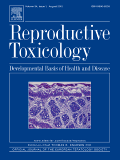
REPRODUCTIVE TOXICOLOGY
Scope & Guideline
Connecting toxicology with reproductive health for informed solutions.
Introduction
Aims and Scopes
- Reproductive Toxicology and Developmental Effects:
Research articles examine how various environmental chemicals, pharmaceuticals, and pollutants impact reproductive health, pregnancy outcomes, and developmental processes in humans and animal models. - Mechanistic Studies:
The journal emphasizes understanding the biological mechanisms through which toxicants exert their effects, including studies on molecular pathways, gene expression, and cellular responses. - Epidemiological Research:
Epidemiological studies are featured to explore the associations between environmental exposures and reproductive health outcomes, providing a population-based perspective on reproductive toxicology. - Innovative Testing Methodologies:
The journal highlights advancements in testing methods, including in vitro and in vivo models, to assess reproductive toxicity and developmental risks associated with chemical exposures. - Focus on Endocrine Disruption:
A significant scope of research is dedicated to the study of endocrine disruptors and their implications for reproductive health, exploring their effects on hormone signaling and reproductive functions.
Trending and Emerging
- Environmental Pollutants and Reproductive Health:
There is an increasing focus on the effects of environmental pollutants, particularly phthalates, bisphenols, and particulate matter, on reproductive health outcomes. This trend is driven by growing awareness of the implications of environmental exposures on fertility and developmental health. - Epigenetics and Reproductive Toxicology:
Research exploring the epigenetic modifications caused by toxic exposures is gaining prominence, emphasizing the long-term effects of environmental factors on gene expression and reproductive outcomes. - Use of Advanced In Vitro Models:
The adoption of innovative in vitro models, including organoids and microphysiological systems, is on the rise, allowing for more accurate assessments of reproductive toxicity and developmental processes. - Neurodevelopmental Impacts of Reproductive Toxicants:
There is a notable trend in studying the neurodevelopmental consequences of reproductive toxicants, linking maternal exposures to behavioral and cognitive outcomes in offspring. - Integrated Approaches to Risk Assessment:
Emerging methodologies that combine transcriptomic, proteomic, and metabolomic analyses are being utilized to provide comprehensive risk assessments related to reproductive toxicology, reflecting a trend towards more holistic evaluation of chemical exposures.
Declining or Waning
- Traditional Animal Models:
While animal studies remain essential, there has been a noticeable decline in the number of studies relying solely on traditional animal models, as researchers increasingly adopt alternative methodologies such as organ-on-a-chip technologies and in vitro systems. - Single Agent Studies:
Research focusing exclusively on the effects of single chemical agents is waning, with a growing emphasis on the impact of chemical mixtures and real-world exposure scenarios that better reflect environmental complexities. - General Toxicity Assessments:
There is a diminishing trend in general toxicity assessments without specific reference to reproductive outcomes, as the field becomes more specialized in understanding the reproductive implications of exposures.
Similar Journals
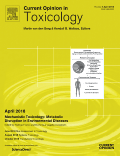
Current Opinion in Toxicology
Advancing Insights in Toxicology ResearchCurrent Opinion in Toxicology is a premier academic journal published by Elsevier, focusing on the latest advancements and perspectives in the field of toxicology. With an impressive impact factor reflecting its high citation and influence within the research community, this journal ranks in the Q1 category for Toxicology, positioned at #8 out of 133 in the Scopus Toxicology domain, placing it in the 94th percentile. The journal aims to provide concise and insightful reviews of contemporary research, fostering an understanding of critical issues related to toxic effects of chemicals and environmental agents. Although not an open access journal, it attracts a worldwide readership, making it an essential resource for researchers, professionals, and students committed to understanding toxicological science. Based in the Netherlands, Current Opinion in Toxicology serves as a platform for stimulating scholarly dialogue and guiding future research directions in this vital area of study.
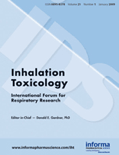
INHALATION TOXICOLOGY
Elevating Knowledge in Inhalation Toxicology.Inhalation Toxicology, published by Taylor & Francis Ltd, is a premier journal dedicated to advancing the field of toxicology with a particular focus on inhalation exposure and its impact on human health. Established in 1989, this journal provides a vital platform for original research, reviews, and case studies that explore the toxicological effects of inhaled substances, making it essential reading for researchers, health professionals, and regulatory scientists. With an Impact Factor that situates it in the Q3 category in both Health, Toxicology and Mutagenesis, the journal asserts its relevance within the scientific community, particularly emphasizing its contributions as indexed by Scopus rankings in related fields. Although it follows a traditional access model, the journal's commitment to delivering high-quality research continues to foster significant discussions and advancements in understanding inhalation toxicology. For those at the forefront of environmental science and pharmacology, Inhalation Toxicology is an indispensable resource for both current research and future innovations in the discipline.

Reproductive and Developmental Medicine
Connecting scholars to elevate reproductive and developmental medicine.Reproductive and Developmental Medicine is a pioneering open-access journal dedicated to advancing knowledge in the fields of reproductive medicine and developmental biology. Published by LIPPINCOTT WILLIAMS & WILKINS, the journal serves as a platform for researchers, clinicians, and graduate students alike, fostering collaboration and dissemination of innovative research findings. With an ISSN of 2096-2924 and E-ISSN 2589-8728, it has established a significant presence in the academic community since its inception in 2017. The journal is indexed in Scopus and achieved a category quartile ranking of Q3 in Obstetrics and Gynecology and Q4 in Reproductive Medicine as of 2023, highlighting its importance as a resource for cutting-edge studies and reviews in these vital areas. The journal's open-access model ensures that research is readily available to scholars and practitioners worldwide, thus enhancing the global discourse in reproductive health and development. This makes Reproductive and Developmental Medicine an invaluable resource for those dedicated to improving outcomes in obstetrics, gynecology, and reproductive health.

JOURNAL OF APPLIED TOXICOLOGY
Unveiling the Complexities of Chemical InteractionsJOURNAL OF APPLIED TOXICOLOGY, published by Wiley, stands as a leading platform in the field of toxicology, focusing on the rigorous examination of chemical substances and their effects on biological systems. With an impressive Impact Factor, it ranks in the top quartile (Q2) for toxicology journals, reflecting its esteemed position within the scientific community. The journal, identifiable by its ISSN 0260-437X and E-ISSN 1099-1263, has been an invaluable resource since its inception in 1981, and it continues to serve as a conduit for innovative research and practical applications through 2024. Positioned at the forefront of the field, it garners recognition in the Scopus Rankings, where it ranks #31 out of 133 journals in the toxicology category, placing it in the 77th percentile—a testament to its contribution to the advancement of pharmacology and toxicological sciences. While not an open-access journal, it remains accessible to a wide audience of researchers, professionals, and students eager to explore cutting-edge findings in applied toxicology, making it a pivotal resource for enhancing knowledge and fostering collaboration in the field.

Molecular & Cellular Toxicology
Advancing the understanding of toxicological impacts at the cellular level.Molecular & Cellular Toxicology, published by the Korean Society Toxicogenomics & Toxicoproteomics (KSTT), is a significant journal in the field of toxicology, providing crucial insights into molecular mechanisms underlying toxic responses. With an ISSN of 1738-642X and E-ISSN 2092-8467, this journal serves as a vital platform for researchers, professionals, and students interested in the latest findings and advancements in toxicology, health, and environmental science. Although it operates under a subscription model, it maintains rigorous peer review standards, contributing to its respectable Q3 classification in Health, Toxicology and Mutagenesis, and its Q2 standing in Pharmacology, Toxicology, and Pharmaceutics. The journal, intersecting with innovative aspects of pharmacology and public health, aims to foster a deeper understanding of toxicological impacts on cellular processes and overall health. Located in Germany and supported by a dedicated editorial board, Molecular & Cellular Toxicology stands out in the academic community, encouraging interdisciplinary discourse and collaboration to address critical toxicological challenges. Engage with us for cutting-edge research that informs and shapes the future of toxicological science.
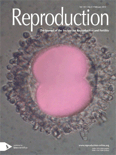
REPRODUCTION
Innovating insights into reproductive mechanisms.REPRODUCTION, published by BIOSCIENTIFICA LTD, stands at the forefront of research in the fields of reproductive and developmental biology. With a focus on advancing our understanding of reproductive health and mechanisms, the journal has garnered an impressive reputation, consistently ranking in the first quartile for key categories including Embryology, Endocrinology, Obstetrics and Gynecology, and Reproductive Medicine in 2023. Notably, it holds an esteemed position in the Scopus rankings, with high percentiles that reflect its significant impact in the scientific community. The journal is committed to open access, promoting the broad dissemination of high-quality research to facilitate innovative discoveries and interdisciplinary collaboration. Situated in the United Kingdom, REPRODUCTION serves as a vital resource for researchers, professionals, and students eager to contribute to the evolving landscape of reproductive sciences and related fields.
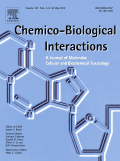
CHEMICO-BIOLOGICAL INTERACTIONS
Fostering Breakthroughs in Toxicology and MedicineCHEMICO-BIOLOGICAL INTERACTIONS is a premier journal published by Elsevier Ireland Ltd, dedicated to advancing the field of chemical and biological interactions since its inception in 1969. With a robust focus on pharmacology and toxicology, the journal holds a prestigious Q1 ranking in both Medicine (miscellaneous) and Toxicology, reflecting its significance in disseminating influential research. As part of the Scopus database, it ranks #21 out of 133 journals in Toxicology, positioning it in the 84th percentile and ensuring high visibility for cutting-edge studies. This scholarly platform serves as a crucial resource for researchers, professionals, and students who seek reliable and innovative findings at the intersection of chemistry and biology. While currently not open access, CHEMICO-BIOLOGICAL INTERACTIONS provides a comprehensive collection of articles that contribute to the ongoing dialogue in toxin research and its implications on medicinal chemistry, thereby fostering advancements in public health and safety.

MOLECULAR REPRODUCTION AND DEVELOPMENT
Pioneering research for a deeper understanding of life.MOLECULAR REPRODUCTION AND DEVELOPMENT is a prestigious peer-reviewed journal published by WILEY, specializing in the intricate domains of Cell Biology, Developmental Biology, and Genetics. Since its inception in 1988, this journal has been a vital platform for disseminating pioneering research and innovative methodologies that advance our understanding of molecular mechanisms driving reproduction and development. With a current impact factor reflective of its significance in the field, MOLECULAR REPRODUCTION AND DEVELOPMENT is ranked Q3 in both Cell Biology and Developmental Biology, and Q2 in Genetics, underscoring its relevance and scholarly contribution. Catering to a diverse audience of researchers, professionals, and students, this journal not only showcases cutting-edge findings but also aims to foster interdisciplinary exchanges that enhance scientific collaboration. By exploring critical biological processes, it ultimately contributes to the broader understanding of health and disease in various organisms, making it an essential resource for anyone dedicated to the life sciences.

Jornal Brasileiro de Reproducao Assistida
Advancing reproductive science for a healthier tomorrow.Jornal Brasileiro de Reprodução Assistida is a prominent academic journal focusing on the latest advancements in reproductive medicine, published by the Sociedade Brasileira de Reprodução Assistida (SBRA). With an ISSN of 1517-5693 and an E-ISSN of 1518-0557, this journal has established itself as a vital resource for researchers, healthcare professionals, and students in the fields of obstetrics and gynecology. Notably recognized within the Q2 category for Obstetrics and Gynecology, it ranks #91 out of 209 in Scopus, placing it in the 56th percentile among its peers. The journal serves as a platform for disseminating innovative research and clinical practices related to assisted reproduction, fostering collaboration and knowledge sharing among professionals in Brazil and beyond. Although currently not an open-access journal, it remains committed to enhancing the scientific discourse in reproductive health, reflecting its vision of supporting advances in healthcare through rigorous peer-reviewed studies. Explore the pivotal contributions made in this field from 2000 to the present, and stay abreast of transformative developments that are shaping reproductive science.

Toxicology Research
Illuminating the path to informed safety practices.Toxicology Research is a distinguished journal dedicated to advancing the field of toxicology through the dissemination of high-quality research. Published by Oxford University Press, this UK-based journal focuses on critical aspects of toxicology and mutagenesis, highlighting both environmental and pharmacological implications. With an ISSN of 2045-452X and an E-ISSN of 2045-4538, it serves as a valuable resource for researchers, professionals, and students alike. Currently categorized in the Q3 quartile for Health, Toxicology and Mutagenesis, as well as Toxicology in 2023, Toxicology Research maintains a visible presence in Scopus rankings, positioning itself within the targeted professional community. Although the journal operates without open access options, its importance in contributing to scientific discussions and policy formation is undeniable. Covering content from 2012 to 2024, it continues to provide insights into contemporary toxicological challenges, thereby fostering interdisciplinary collaborations and informing best practices in health and safety.